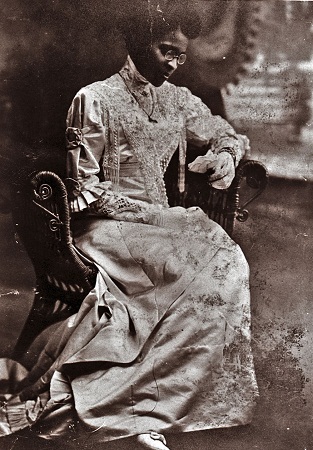See also: Brown, Charlotte Hawkins from the Dictionary of North Carolina Biography; Charlotte Hawkins Brown for K-8 Students
1883 - 1961

Emancipation from slavery in 1865 offered a new and prosperous lifestyle for some African Americans in North Carolina. Some became landowners or politicians; others started their own businesses. Yet by 1900 "jubilation" had become "Jim Crow" and African Americans once again found themselves treated as an inferior race.
During this period, however, African American leaders were emerging who dedicated themselves to improving the status and quality of life for African American citizens. One such person was Dr. Charlotte Hawkins Brown.
The granddaughter of former slaves, Lottie Hawkins was born in Henderson, North Carolina in 1883. During her childhood, the Hawkins family moved to Cambridge, Massachusetts, where Lottie attended Cambridge English High School and Salem State Normal School.
While she was a student at Salem State, the American Missionary Association offered her a teaching position in North Carolina. Dissatisfied with the lack of educational opportunities for African Americans in the South, Hawkins accepted. The eighteen year-old returned to North Carolina in 1901 to teach rural black children at the Bethany Congregational Church in Sedalia, Guilford County. The school closed after one term, but young Hawkins decided to remain in the community and establish her own school.
In 1902, after vigorously raising money in the New England area, Charlotte Hawkins founded Palmer Memorial Institute in Sedalia, a day and boarding school for African Americans. Established in a converted blacksmith's shop, the school was named in memory of Alice Freeman Palmer, Charlotte's friend and chief benefactor. Mrs. Palmer was also the second woman president of Wellesley College in Massachusetts. Under the leadership of Charlotte Hawkins Brown, Palmer Memorial Institute became a nationally recognized and respected preparatory school for African Americans.

In its early years, Palmer's curriculum emphasized manual training and industrial education for rural living. Brown had expanded the school to over 350 acres of land, including a sizable farm. As the decade of the thirties came to a close, both the school's academic importance and its emphasis on cultural education increased.
Palmer Memorial Institute was the product of Dr. Brown's love and almost single-handed labor. The Institute was fully accredited by the Southern Association of Colleges and Secondary Schools at a time when few black high schools enjoyed this recognition. During her 50 year presidency, over one thousand students graduated. They had gained not only a diploma but also a firm idea of their own individual worth. Dr. Brown had taught them well - they would be "educationally efficient, religiously sincere, and culturally secure".
As the fame of the school spread, Dr. Brown became nationally known not only as an educator but also as a lecturer, social worker, and religious leader. She received several honorary degrees and her associates included Mary McLeod Bethune, Nannie Helen Burroughs, Eleanor Roosevelt, W.E.B. DuBois, and Booker T. Washington.
Charlotte Hawkins Brown was a woman with pride in herself and her people. She had a deep belief in the American principles of freedom and justice for all human beings and she expressed this commitment eloquently. She succeeded in showing for all the world to see "what a young black woman could do."
Dr. Brown died in 1961. Ten years and three administrations later Palmer closed its doors.
North Carolina can proudly claim a multitude of African American citizens like Charlotte Hawkins Brown. The Charlotte Hawkins Brown Museum honors those citizens and was established by the North Carolina Department of Cultural Resources, Division of Archives and History, Historic Sites Section. It is North Carolina's first historic site honoring an African American and the State's first historic site honoring a woman.